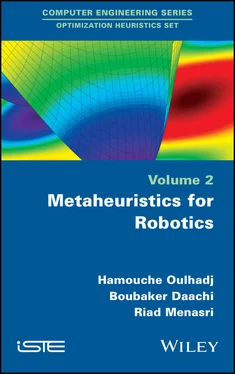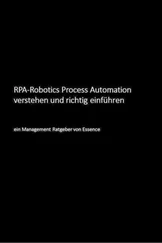4 ix
5 x
6 xi The methods developed make use of optimization metaheuristics, which are high-level abstraction algorithms. Unlike heuristics, which are computational processes, often informally and “individually” adapted to specific problems, metaheuristics are general algorithms applicable to a very wide range of optimization problems, without the need to resort to a fundamental modification of the structure of these algorithms. The methods studied and results achieved are commented on and presented in detail for each of the applications addressed. Although the proposed methods are developed within the context of their application to medical robotics, their generic nature allows them to be easily expanded to other optimization problems which do not necessarily fall within the same scope of application. Hamouche OULHADJ Boubaker DAACHI Riad MENASRI November 2019
7 xiii
8 xiv
9 xv
10 xvi
11 xvii
12 xviii
13 xix
14 1
15 2
16 3
17 4
18 5
19 6
20 7
21 8
22 9
23 10
24 11
25 12
26 13
27 14
28 15
29 16
30 17
31 18
32 19
33 20
34 21
35 22
36 23
37 24
38 25
39 27
40 28
41 29
42 30
43 31
44 32
45 33
46 34
47 35
48 36
49 37
50 38
51 39
52 40
53 41
54 42
55 43
56 44
57 45
58 46
59 47
60 48
61 49
62 50
63 51
64 52
65 53
66 54
67 55
68 56
69 57
70 58
71 59
72 60
73 61
74 62
75 63
76 64
77 65
78 66
79 67
80 68
81 69
82 70
83 71
84 72
85 73
86 74
87 75
88 76
89 77
90 78
91 79
92 80
93 81
94 82
95 83
96 84
97 85
98 87
99 88
100 89
101 90
102 91
103 92
104 93
105 94
106 95
107 96
108 97
109 98
110 99
111 100
112 101
113 102
114 103
115 104
116 105
117 106
118 107
119 108
120 109
121 110
122 111
123 112
124 113
125 114
126 115
127 116
128 117
129 118
130 119
131 121
132 122
133 123
134 124
135 125
136 126
137 127
138 128
139 129
140 130
141 131
142 132
143 133
144 134
145 135
146 136
147 137
148 138
149 139
150 140
151 141
152 142
153 143
154 144
155 145
156 147
157 148
158 149
159 150
160 151
161 153
162 154
163 155
164 156
165 157
166 158
167 159
168 160
169 161
170 162
171 163
172 165
Optimization Heuristics Set
coordinated by
Nicolas Monmarché and Patrick Siarry
Volume 2
Metaheuristics for Robotics
Hamouche Oulhadj
Boubaker Daachi
Riad Menasri

First published 2020 in Great Britain and the United States by ISTE Ltd and John Wiley & Sons, Inc.
Apart from any fair dealing for the purposes of research or private study, or criticism or review, as permitted under the Copyright, Designs and Patents Act 1988, this publication may only be reproduced, stored or transmitted, in any form or by any means, with the prior permission in writing of the publishers, or in the case of reprographic reproduction in accordance with the terms and licenses issued by the CLA. Enquiries concerning reproduction outside these terms should be sent to the publishers at the undermentioned address:
ISTE Ltd
27-37 St George’s Road
London SW19 4EU
UK
www.iste.co.uk
John Wiley & Sons, Inc.
111 River Street
Hoboken, NJ 07030
USA
www.wiley.com
© ISTE Ltd 2020
The rights of Hamouche Oulhadj, Boubaker Daachi and Riad Menasri to be identified as the authors of this work have been asserted by them in accordance with the Copyright, Designs and Patents Act 1988.
Library of Congress Control Number: 2019952981
British Library Cataloguing-in-Publication Data
A CIP record for this book is available from the British Library
ISBN 978-1-78630-380-6
Optimization deals with methods that make it possible to optimize the use, operation and performance conditions of a system, whether it is physical or related to human activity. Situated at the crossroads of several disciplines, namely applied mathematics, computer science and artificial intelligence, optimization makes it possible to quickly find a solution to numerous problems which would otherwise be more difficult to solve relying solely on restricted mathematical analysis.
Based on heuristics or even metaheuristics at a higher level, optimization methods provide operational solutions, which are not necessarily optimal solutions but eligible suboptimal solutions, so-called acceptable solutions, because they demonstrate the level of performance required to reach a goal without conflicting with associated constraints. A number of problems whose resolution is based on optimization methods can be provided as examples:
— in finance, tax optimization is a means to minimize legal taxation;
— in databases, query optimization makes it possible to improve the accessibility of shared data, in particular by reducing transaction time;
— in telecommunications networks, routing optimization is a method for finding suitable paths for data exchange;
— in robotics, optimization allows, to take just one example, the identification of the best configurations (joint variables) that a robot must undergo in order to efficiently perform a task;
— in computer science, optimizing the code of a program makes it possible to reduce the memory space occupied and to increase the convergence time.
The applications outlined above are inherently very complex, which raises the problems of implementing accurate mathematical methods that provide admissible solutions without having to mobilize huge computational resources. In these circumstances, we are limited to considering approximated solutions, which are suboptimal solutions, but acceptable, ones since they guarantee goal realization while satisfying constraints.
In this book, we will address issues specifically related to the field of medical robotics. The focus of the applications being considered is on trajectory planning for redundant manipulative arms (articulated robots) within the context of surgical gesture assistance, and robust control for effort compensation or physical assistance in disability situations (exoskeleton). These applications are presented in detail, with the aim of understanding with the utmost clarity the problems to be solved, as well as the choices made to find effective solutions within a reasonable time frame.
The methods developed make use of optimization metaheuristics, which are high-level abstraction algorithms. Unlike heuristics, which are computational processes, often informally and “individually” adapted to specific problems, metaheuristics are general algorithms applicable to a very wide range of optimization problems, without the need to resort to a fundamental modification of the structure of these algorithms. The methods studied and results achieved are commented on and presented in detail for each of the applications addressed. Although the proposed methods are developed within the context of their application to medical robotics, their generic nature allows them to be easily expanded to other optimization problems which do not necessarily fall within the same scope of application.
Читать дальше












